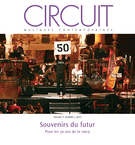
Circuit
Scope & Guideline
Pioneering Insights for Tomorrow's Technologies
Introduction
Aims and Scopes
- Interdisciplinary Exploration of Music:
The journal publishes works that bridge music with other fields such as sociology, anthropology, and environmental studies, highlighting the interconnectedness of music with broader cultural and societal themes. - Focus on Contemporary Composers and Artists:
'Circuit' frequently features profiles and interviews with contemporary composers and artists, providing insight into their creative processes and contributions to the music landscape. - Cultural and Geographical Perspectives:
The journal explores musical practices across diverse geographical contexts, particularly focusing on the interactions between Latin American and Canadian musical traditions, thereby enriching the discourse on global music. - Ecological and Societal Concerns in Music:
A significant aim of the journal is to address the role of music in ecological contexts and social movements, exploring how music can serve as a form of activism and a response to contemporary global challenges. - Historical Contextualization of Music:
The journal also delves into the historical aspects of music, presenting analyses of past compositions and their relevance to contemporary practices, thus creating a dialogue between different eras of music.
Trending and Emerging
- Music and Activism:
There is a growing emphasis on the role of music as a tool for social change and activism, particularly in the context of ecological issues and cultural representation, showcasing how artists engage with pressing global challenges. - Intercultural Musical Dialogues:
The journal increasingly features works that explore intercultural exchanges in music, highlighting how different musical traditions influence and enrich each other in a globalized world. - Ecological Sound Art:
Themes surrounding ecological concerns and the Anthropocene are becoming more prominent, with discussions on how music can respond to environmental crises and reflect ecological awareness in artistic practices. - Queer Perspectives in Music:
Emerging discussions around queer identities and narratives in contemporary music are gaining traction, indicating a shift towards inclusivity and diverse representations within the field. - Technological Innovations in Music Composition:
There is a notable trend towards exploring the impact of technology on music creation and performance, including the use of digital tools and platforms that reshape the ways music is produced and experienced.
Declining or Waning
- Traditional Music Forms:
There seems to be a decline in the focus on traditional or classical music forms, as the journal increasingly emphasizes contemporary practices and innovative compositions that challenge conventional boundaries. - Exclusively Academic Perspectives:
The journal appears to be moving away from strictly academic analyses of music theory and history, favoring more accessible and interdisciplinary approaches that engage with the public and artistic communities. - Solo Artist Focus:
There is a noticeable reduction in papers concentrating solely on individual artist profiles without a broader context, as the journal shifts towards collective and collaborative artistic endeavors. - Conventional Music Reviews:
The traditional format of music reviews, particularly those that do not engage critically with broader themes or societal implications, seems to be declining in favor of more analytical and thematic explorations.
Similar Journals

Muzikoloski Zbornik
Celebrating Diverse Voices in MusicologyMuzikoloski Zbornik is a prominent open-access journal in the field of musicology, published by the esteemed University of Ljubljana Press since 1965. Hailing from Slovenia, this journal has been dedicated to advancing the study of musical heritage, theory, and practice, serving as a vital platform for researchers, professionals, and students alike. With a notable Q2 category ranking in the field of music and a Scopus ranking of 109 out of 180 in Arts and Humanities, Muzikoloski Zbornik showcases high-quality research, fostering discourse and collaboration among scholars globally. The journal embraces a diverse range of topics, from ethnomusicology to music education, ensuring its relevance in an ever-evolving academic landscape. By providing unrestricted access to its content, it champions the dissemination of knowledge and supports the growth of the musicology discipline.

OR SPECTRUM
Exploring the Frontiers of Business and Operations ResearchOR SPECTRUM, published by SPRINGER, is a premier journal in the fields of Business, Management, and Operations Research, with a distinguished reputation established since its inception in 1979. As of 2023, it holds an impressive Q1 ranking in Business, Management and Accounting (miscellaneous) and a Q2 ranking in Management Science and Operations Research. The journal, which is indexed under ISSN 0171-6468 and E-ISSN 1436-6304, boasts a significant impact factor within its scope, making it a pivotal resource for cutting-edge research and theoretical developments. With access options that favor traditional subscriptions, OR SPECTRUM offers a robust platform for the dissemination of innovative ideas and methodologies, vital for academics, professionals, and students alike. The journal's commitment to excellence ensures its critical role in enhancing the understanding and application of operational research techniques around the globe.
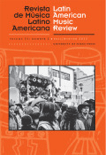
LATIN AMERICAN MUSIC REVIEW-REVISTA DE MUSICA LATINOAMERICANA
Diving Deep into the Heartbeat of Latin American SoundscapesLATIN AMERICAN MUSIC REVIEW-REVISTA DE MUSICA LATINOAMERICANA stands as a prominent scholarly journal dedicated to the profound and diverse traditions of Latin American music. Published by University of Texas Press, this journal offers a platform for critical analysis, innovative research, and the dissemination of knowledge concerning the rich cultural heritage of Latin America. Although it currently does not provide open access options, the journal has made significant contributions to the field since its establishment, engaging a wide array of interdisciplinary perspectives. With coverage spanning from 2002 to 2009, the journal has been central to fostering scholarly dialogue and expanding the academic understanding of Latin American musicology, serving as an essential resource for researchers, professionals, and students alike. The journal is vital for those exploring the intersections of music, culture, and identity within the vibrant landscapes of Latin America.
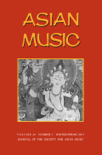
ASIAN MUSIC
Connecting Cultures Through the Language of Music.ASIAN MUSIC is a distinguished academic journal published by University of Texas Press, focusing on the rich and diverse musical traditions of Asia. With an ISSN of 0044-9202 and an E-ISSN of 1553-5630, this journal serves as a key platform for interdisciplinary research that encompasses musicology, ethnomusicology, and cultural studies related to Asian music practices. While ASIAN MUSIC is not an open-access journal, it provides valuable insights and scholarly articles that contribute significantly to the understanding of music’s role within Asian cultures. The journal originally covered works from 2002 to 2010 and has a reputation for fostering discussions that celebrate the intricacies of sound, performance, and society. Targeting researchers, professionals, and students alike, ASIAN MUSIC stands as a crucial resource for those engaged in the study of music in its multifaceted context.
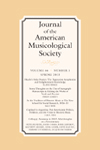
JOURNAL OF THE AMERICAN MUSICOLOGICAL SOCIETY
Unveiling the complexities of music and society.JOURNAL OF THE AMERICAN MUSICOLOGICAL SOCIETY, published by University of California Press, is a prestigious peer-reviewed journal dedicated to advancing the field of musicology. With an ISSN of 0003-0139 and E-ISSN 1547-3848, this journal has been a cornerstone of scholarly communication since its inception in 1970 and continues to be relevant through 2024. Its esteemed standing is reflected in its Q2 ranking in the Music category and a respectable 71/180 ranking in the Arts and Humanities discipline, placing it in the 60th percentile among its peers. The journal provides an essential platform for researchers, professionals, and students to explore diverse topics in musicology, ranging from historical studies to contemporary analyses. While it does not currently offer Open Access options, its rigorous editorial standards ensure the publication of high-quality research that contributes significantly to the academic dialogue in music studies. With its address based in the United States at 155 Grand Ave, Suite 400, Oakland, CA 94612-3758, the journal remains a vital resource for those seeking to deepen their understanding of the complexities of music and its societal impacts.

REVUE DE MUSICOLOGIE
Illuminating the Historical Pathways of MusicREVUE DE MUSICOLOGIE is a prominent academic journal dedicated to the diverse field of musicology, published by EDITIONS TRANSATLANTIQUES in France. With an ISSN of 0035-1601, this journal has been a key platform for researchers and scholars since its inception, fostering scholarly discourse and advancing the understanding of music's cultural, theoretical, and historical dimensions. Although it currently holds a Q4 category in Music according to the 2023 quartiles and is ranked #140 in the Scopus Arts and Humanities Music category, REVUE DE MUSICOLOGIE continues to publish valuable insights that contribute to the global musicological landscape. The journal does not offer open access, adhering to standard subscription models. Its primary objective is to provide a rigorous forum for original research articles, reviews, and theoretical discussions, making it an essential resource for academics, professionals, and students in the field of musicology. Located at 50 RUE JOSEPH DE MAISTRE, 75018 PARIS, FRANCE, it promises to remain a vital part of music research through 2023 and beyond.

MUSICAL TIMES
Navigating the Rich Tapestry of Musical DiscourseMUSICAL TIMES is a distinguished journal dedicated to the exploration and dissemination of scholarly works in the realm of music, serving as an essential resource for researchers, professionals, and students alike. Published by MUSICAL TIMES PUBLICATIONS LTD, this journal has built a robust reputation within the arts and humanities, specifically focusing on music studies, with an impactful reach indicated by its Scopus ranking at #73 out of 106 in the field. Though access to this journal is not open, its curated content, which spans various facets of musicology and contemporary music discourse, enriches the academic community by encouraging insightful discussions and critical analyses. With its historical roots tracing back to its inception, MUSICAL TIMES aims to foster a deeper understanding of music's cultural, social, and artistic dimensions, making it a valued publication for those engaged in the scholarly pursuit of music.
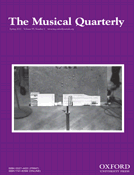
MUSICAL QUARTERLY
Exploring the Rich Tapestry of Music ScholarshipMUSICAL QUARTERLY, published by Oxford University Press Inc, is a distinguished journal in the field of music, with a publication history that stretches back to 1915. This esteemed journal, identifiable by its ISSN 0027-4631 and E-ISSN 1741-8399, provides a critical platform for scholarly discourse, analysis, and research in musicology and related disciplines, facilitating an understanding of both historical and contemporary musical practices. Although it operates without open access, it continues to attract a diverse readership of researchers, educators, and students alike, thanks to its well-curated articles and reviews that engage with music theory, history, and ethnomusicology. With a current Scopus rank of #119 out of 180 in the Arts and Humanities category and a 34th percentile ranking in Music, MUSICAL QUARTERLY plays a vital role in advancing knowledge and fostering collaboration within the music academic community. Its commitment to high-quality scholarship is reflected in its ongoing efforts to address the evolving landscape of music studies, making it an essential resource for anyone serious about exploring the rich tapestry of music scholarship.
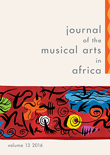
Journal of the Musical Arts in Africa
Exploring the Rhythms of Cultural IdentityThe Journal of the Musical Arts in Africa is a premier academic publication dedicated to exploring the rich and diverse musical traditions of the African continent. Published by ROUTLEDGE JOURNALS, TAYLOR & FRANCIS LTD, this journal offers a vital platform for researchers, professionals, and students in the field of musicology. With an ISSN of 1812-1004 and E-ISSN of 2070-626X, the journal has established itself as a significant contributor to the scholarly discourse surrounding African musical practices. With an impact factor reflecting its growing influence, the Journal of the Musical Arts in Africa is categorized in the Q3 quartile of music journals according to the latest metrics, placing it among an essential cadre of publications in the field. The journal invites original research articles, reviews, and critical essays that aim to expand the understanding of music as an integral part of African culture. It has been continuously publishing since 2004 and encompasses a wide range of topics, making it a must-read for anyone interested in the intersections of music, culture, and identity on the African continent. The journal stands as a testament to the vibrant musical heritage of Africa and encourages scholarly contributions that highlight the importance of music in reflecting and shaping societal values.
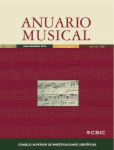
Anuario Musical
Connecting scholars through a vibrant artistic lens.Anuario Musical, with its ISSN 0211-3538 and E-ISSN 1988-4125, is a prestigious journal in the fields of Music, Visual Arts, and Performing Arts, published by CONSEJO SUPERIOR INVESTIGACIONES CIENTIFICAS-CSIC in Spain. Since becoming an Open Access journal in 1995, it has played a crucial role in disseminating cutting-edge research and fostering scholarly communication in these dynamic disciplines. The journal has achieved notable rankings in the 2023 category quartiles, being placed in Q2 for Music and Q1 for Visual Arts and Performing Arts, reflecting its commitment to high-quality scholarship. Furthermore, it is indexed in Scopus with respectable ranks—#294/667 in Visual Arts and Performing Arts and #105/180 in Music—underscoring its relevance in the global academic landscape. Between 2011 and 2023, Anuario Musical has published a diverse range of articles that contribute significantly to the understanding and appreciation of music and the arts, making it an essential resource for researchers, professionals, and students alike. For more details, the journal is based at Editorial CSIC, C/VITRUVIO 8, 28006 MADRID, SPAIN.